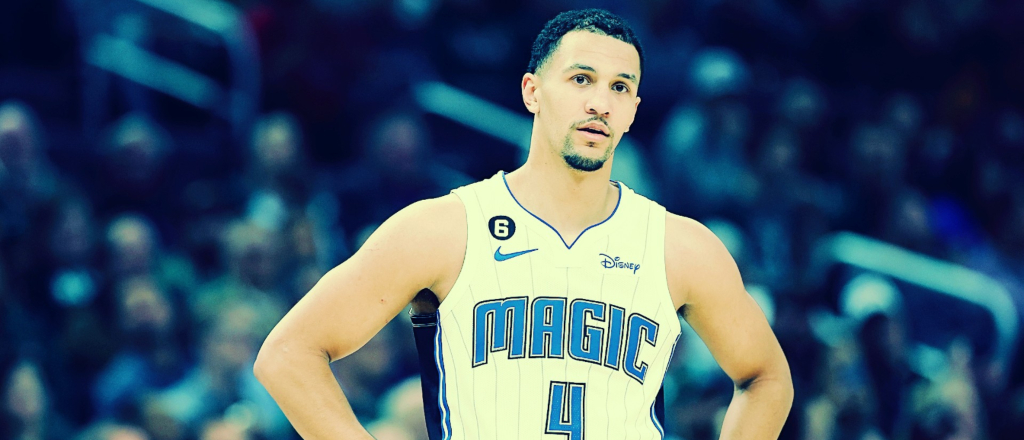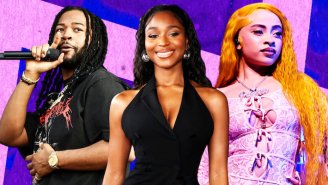Jalen Suggs exudes a perpetual sense of optimism, enthusiasm, and inspiration, even if he’s a bit tired as he collects himself following a mid-evening nap. Over the past few days, the third-year guard has been busy and invigorated while coaching at the International School of Johannesburg in South Africa for the 19th installment of Basketball Without Borders Africa, which spotlights 80 of Africa’s top high-school-aged prospects.
Alongside Suggs are contemporaries in Bam Adebayo, Darius Garland, and Jonathan Kuminga, as well as current and former NBA head coaches J.B. Bickerstaff, Darvin Ham, Mike Brown, Dwane Casey, and Dave Joerger. All of them made the trip to bestow their tutelage upon a new group of hoopers, and Suggs appears particularly excited about the chance afforded to him.
It’s not hard to imagine the former Gonzaga standout and No. 5 pick in the 2021 NBA Draft being perpetually excited considering where he is in his career right now. In his second season, Suggs and the Magic paralleled notable jumps. Orlando won 12 more games (22 to 34) than the year prior, while Suggs saw considerable upticks in his scoring efficiency. He shot 5.3 percent better on two-pointers (44.3 vs. 49.6) and 11.3 percent better beyond the arc (21.4 vs. 32.7) — including 38.2 percent from Jan. 25 onward — and raised his true shooting percentage from 45.5 to 52.8. And now, both Suggs and the franchise are eyeing a prolific 2023-24 campaign, as Orlando is putting together one of the league’s most promising collections of young talent.
On behalf of the NBA and Basketball Without Borders, Dime chatted with Suggs about why he believes it’s important to give back to younger generations, what the first fully healthy offseason of his career means for him and much more.
Why was the opportunity to coach in this Basketball Without Borders camp important for you?
I believe that it really aligns with my values and what I’ve been doing. I have two AAU programs, boys and girls, 15 through 17, a couple younger ages, and helping out with kids and the next generation, if you will. I know I’m still pretty young, but just those up-and-coming players, especially in my sport, something that I have a lot of pride and passion in. I just thought it really aligned with that, and coming over here, it’ll be a great opportunity to be around some of the better coaches in our league, some of the best of my peers in the league and I just thought it’d be very cool. This is an opportunity that not a lot of people get. It’s special. I was blessed to have them ask me. There’s no way I could turn it down.
You mention those values. What are you trying to impart on these kids and what are you also trying to take away from the coaches you referenced earlier?

I know how important looking up to guys, and seeing and hearing from them in person. When I was growing up and on my way up, I know how important that was to me and how big of a difference it made. So, knowing that, I want to be able to have an impact. I’ve been given this stage to have an impact on people and to go and reach people from not only my home in Minnesota, but now on the national level and international level, to be able to be around kids who are from a completely different culture, come from a completely different continent than I did, but still look at me and want to get into position I am in. I feel like I’d be doing myself a disservice if I didn’t help out and give advice, just come be here and show my presence. So, using my platform for something bigger than just basketball is really important to me, so it was a perfect opportunity.
Who are some of the people that you feel like played the role you’re in now when you were growing up that maybe shape how you try to help the younger communities today?
I think the biggest one was Tyus Jones. He was somebody who, as a kid, I went to all the EYBL games and all their high school games. I think he was the biggest one. So, for me to be able to come back and do that tenfold, I’d be able to do the same thing, have the same impact, it means a lot to me. Not only does it mean a lot, but I enjoy doing it. And I feel like that’s one of the biggest things that you can do when you get to this point is now reach out and help others same way that they did for you. I think it’d be selfish if you didn’t. So, it’s been a great opportunity and I’ve loved being out here.
I want to do it again. They’ve told me that they go all over the place. So, I think going to a Spanish-speaking country next so that I can use my Spanish, which I’m fluent in, to go to use that there. Speak and talk to the locals and kind of be more immersed in that culture, I think would be dope. But this has been an amazing opportunity.
With Tyus, what did you specifically learn from him that just helps you in life, basketball or this specific role now being a mentor to others?
Just his consistent work and how he was always working to get better, the way he plays the game, unselfish, the right way, finding open guys, hitting teammates and things like that, and just being a winner. Being able to be around that as a kid a lot was really big for me, gave me something to strive and something to the reach for. Just his entire family, they recognize how important he was to me and that he was a role model, someone I was looking up to and our families became close. They told me a lot about what they had going on and different struggles and things like that. So, it was really good to have somebody in that position, in a place I was chasing to be, just to give advice and support from. It was very important and I’m thankful to this day for him and his family.
In your own game, where do you feel like you made the most strides in year two?
I think in my confidence, just becoming more comfortable in the game. It slowed down a lot. I was able to take advantage of different opportunities. Like I said, the injuries didn’t slow down. But that was part of the game. But I feel like while I was out there, I was more comfortable in the game and more confident in being able to get to my spots and understanding what to do and how I can have an impact. And then, of course, just the shot-making definitely improved. I knew I was a better shooter than I had shown my first year. So, making those strides were important to me. I’m just looking to build off that. My first full healthy offseason has been really important and a big one. I’ve been taking advantage of it, so looking forward to coming into next year and building off what I did last year and what I’ve been doing this summer, really just show people the player that I am and who I’ve been.
With the comfort and the shot-making, what’s the relationship and process there? Is it improved comfort leads to better shot-making or do you make some more shots and start to feel more comfortable as a result?
I think it’s comfort first. There’s a lot going on. It was a big shift. It was a big change in my life that first year. In my mind, I was just going through a lot of things, so the comfort level wasn’t there, but this past season, I was fully focused, fully locked in, understanding where I was at, what I needed to do. I think it shows, I think I looked a bit more comfortable. I shot it better. I was more confident. Understanding that basketball is a game that I’ve played my entire life and there’s no reason to reinvent the wheel or do anything different. I understood my talents and my abilities. So, I think from there, I got more confident and then with the work, I shot it well.
Having this be your first fully healthy offseason, what does that unlock for you in terms of your training, the things that you’re looking to address and continue improving on entering year three?
Just being able to work on everything without having to manage any load or nagging injuries. I can fully be explosive, go to the basket, I can play 1s, I can play 2-on-2, 3-on-3, 5s. I can do all those things where the past couple of summers I’ve been coming off of surgery or dealing with those injuries. Going full speed and doing those things wasn’t the best for my body and I wasn’t able to do them yet. So, a big emphasis has been just doing everything for speed, getting reps, getting a lot of live action against bodies, in pick-and-rolls, and with people and help and things like that. I just feel more explosive, I feel more confident moving in my body. I think that’s been really important for me.
What do you think is distinct about coach [Jahmal] Mosley’s approach compared to previous coaches you’ve had? What stands out to you about the way he teaches and helps develop the group you’ve got in Orlando?
I think he just does a great job of being there for us. He’s very active when he’s in the gym. He’s not just sitting there, whether it’s in his office or on the sidelines. He’s in the workouts and all that, and making sure that we understand and see and feel the things that are going to be going on in the game. Like I said about going game speed and going hard, he’s big on that. It’s been it’s been a good summer with him, Nate [Tibbetts], Randy [Gregory], all the support staff, they’ve been doing a great job with us and working and being there and being consistent with it. So, it’s been a great summer so far, looking to get back home now after this opportunity. Just get ready to work and carry over the vibes that I got here that I was already feeling. All the players here are so genuine, eager to learn. They love practicing, learning. I think cherishing every moment they had in this opportunity, so now looking to take that mindset back and finish the summer off strong. Get ready to head into training camp and next year.
This interview has been lightly edited for clarity.







